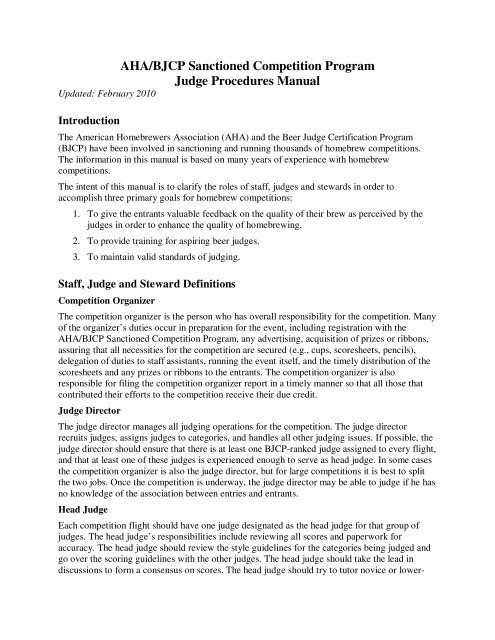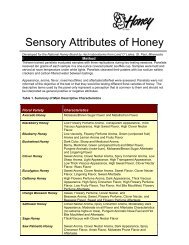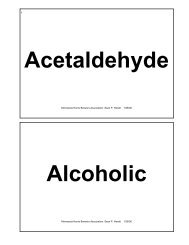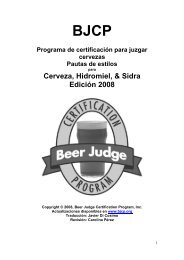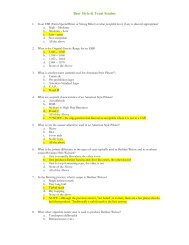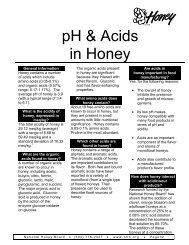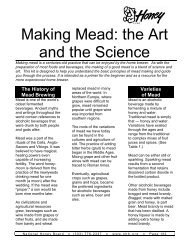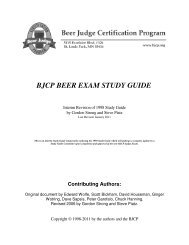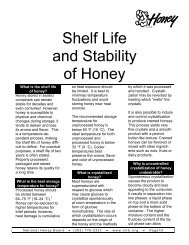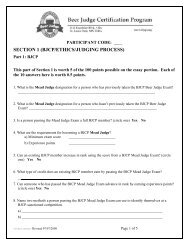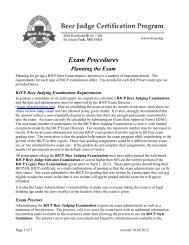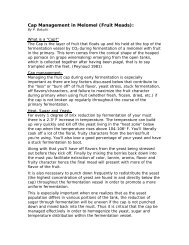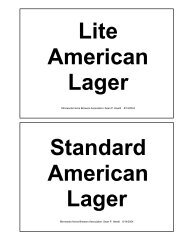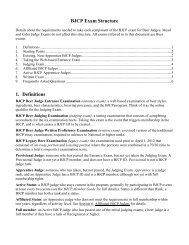Judge Procedures Manual - BJCP
Judge Procedures Manual - BJCP
Judge Procedures Manual - BJCP
Create successful ePaper yourself
Turn your PDF publications into a flip-book with our unique Google optimized e-Paper software.
AHA/<strong>BJCP</strong> Sanctioned Competition Program<br />
<strong>Judge</strong> <strong>Procedures</strong> <strong>Manual</strong><br />
Updated: February 2010<br />
Introduction<br />
The American Homebrewers Association (AHA) and the Beer <strong>Judge</strong> Certification Program<br />
(<strong>BJCP</strong>) have been involved in sanctioning and running thousands of homebrew competitions.<br />
The information in this manual is based on many years of experience with homebrew<br />
competitions.<br />
The intent of this manual is to clarify the roles of staff, judges and stewards in order to<br />
accomplish three primary goals for homebrew competitions:<br />
1. To give the entrants valuable feedback on the quality of their brew as perceived by the<br />
judges in order to enhance the quality of homebrewing.<br />
2. To provide training for aspiring beer judges.<br />
3. To maintain valid standards of judging.<br />
Staff, <strong>Judge</strong> and Steward Definitions<br />
Competition Organizer<br />
The competition organizer is the person who has overall responsibility for the competition. Many<br />
of the organizer’s duties occur in preparation for the event, including registration with the<br />
AHA/<strong>BJCP</strong> Sanctioned Competition Program, any advertising, acquisition of prizes or ribbons,<br />
assuring that all necessities for the competition are secured (e.g., cups, scoresheets, pencils),<br />
delegation of duties to staff assistants, running the event itself, and the timely distribution of the<br />
scoresheets and any prizes or ribbons to the entrants. The competition organizer is also<br />
responsible for filing the competition organizer report in a timely manner so that all those that<br />
contributed their efforts to the competition receive their due credit.<br />
<strong>Judge</strong> Director<br />
The judge director manages all judging operations for the competition. The judge director<br />
recruits judges, assigns judges to categories, and handles all other judging issues. If possible, the<br />
judge director should ensure that there is at least one <strong>BJCP</strong>-ranked judge assigned to every flight,<br />
and that at least one of these judges is experienced enough to serve as head judge. In some cases<br />
the competition organizer is also the judge director, but for large competitions it is best to split<br />
the two jobs. Once the competition is underway, the judge director may be able to judge if he has<br />
no knowledge of the association between entries and entrants.<br />
Head <strong>Judge</strong><br />
Each competition flight should have one judge designated as the head judge for that group of<br />
judges. The head judge’s responsibilities include reviewing all scores and paperwork for<br />
accuracy. The head judge should review the style guidelines for the categories being judged and<br />
go over the scoring guidelines with the other judges. The head judge should take the lead in<br />
discussions to form a consensus on scores. The head judge should try to tutor novice or lower-
anked judges as time permits. Once judging is complete, the head judge is responsible for<br />
ensuring that scoresheets, cover sheets, and flight summary sheets are filled out and turned in to<br />
the judge director or competition organizer as directed by the competition management.<br />
<strong>Judge</strong><br />
A judge is any participating person whose scores count when evaluating competition entries.<br />
<strong>BJCP</strong> judges are participants in the Beer <strong>Judge</strong> Certification Program who have taken the <strong>BJCP</strong><br />
exam. It is recommended that novice judges be paired with <strong>BJCP</strong> judges.<br />
Novice <strong>Judge</strong><br />
A novice judge is someone relatively inexperienced at judging beer in competition, but who has<br />
been approved to evaluate entries by the competition organizer. Novice judges are not members<br />
of the <strong>BJCP</strong>. Participating in a homebrew competition with experienced judges is an excellent<br />
educational opportunity for aspiring judges.<br />
Steward<br />
The job of a steward is to help the judges. While the head judge is the person responsible for all<br />
activities for the judging flight, the steward assists as needed. Whenever possible, one steward<br />
should be assigned to each flight. Most flights have between two and four judges assigned; three<br />
is considered optimal. Stewards ensure that the judges have all of the judging materials they need<br />
including judging forms, pencils, cups, bottle openers, water, and bread or crackers. Stewards<br />
often bring the competition entries to the judges in the order specified by the head judge.<br />
Stewards should NOT open the competition entries unless specifically directed by the head<br />
judge. During the judging, stewards double-check all of the competition forms, including the<br />
cover sheets, to be sure they have been properly completed and that the math has been done<br />
correctly. Stewards may calculate the final assigned score if the head judge directs the steward to<br />
use a simple average score (i.e., arithmetic mean). Judging is an intensive process, and the<br />
stewards play a key role in making sure all goes smoothly. Serving as a steward is an excellent<br />
means of learning about beer evaluation and is usually the first step in becoming a beer judge.<br />
Guidelines for Conduct<br />
<strong>Judge</strong>s, stewards and other volunteers must maintain uniform standards.<br />
Participant Conduct, Responsibilities, and Expectations<br />
<strong>Judge</strong>s, stewards and staff should all realize that when they volunteer to help in a competition<br />
that they are making a commitment to the Organizer, who then relies on them to help make the<br />
competition a success. <strong>BJCP</strong> Members and all other volunteers should make every effort to<br />
fulfill their commitments. If for some reason a volunteer cannot attend as planned, it is the<br />
volunteer’s responsibility to notify the Organizer as soon as possible. Volunteers that neglect<br />
their duties (particularly if they fail to notify an Organizer in advance that they cannot attend)<br />
should not be surprised if they are not invited back to participate in future competitions.<br />
Competition judges and volunteers should behave in a civil and forthright manner. Follow these<br />
guidelines to make competition judging fair and fun for everyone involved:<br />
• Be prompt to all sessions.<br />
• Do not become intoxicated during any portion of a judging session or event while serving<br />
as a judge.
• Do not use tobacco, perfume, cologne or aftershave in the judging room.<br />
• Speak in a hushed conversational tone to avoid distracting others.<br />
<strong>Judge</strong>s<br />
• Do not judge in a category you have entered.<br />
• Review the style guidelines for the category you are judging before you begin.<br />
• Discuss the general characteristics of an entry, but do not attempt to influence opinions of<br />
other judges. Be patient, tactful, and respectful of others. The head judge may approve<br />
continued discussions if appropriate.<br />
• Seek guidance from the judge director if you notice another judge practicing any<br />
questionable behavior.<br />
• Be objective in judging to style guidelines, even if this is not a style that you personally<br />
enjoy.<br />
• Strive to maintain anonymity of entries.<br />
Novice <strong>Judge</strong>s<br />
• Novice judges may evaluate entries only as authorized by the judge director.<br />
• Follow all other guidelines for judges.<br />
Stewards<br />
• Assist organizers and judges as needed.<br />
• Make sure all required materials are present at the assigned judging table.<br />
• Ensure that everything required for judging, including openers, cups, pencils, scoresheets,<br />
ice, dump buckets, water, and crackers/bread is at the assigned table prior to the<br />
scheduled start for the judging.<br />
• Bring beer for the given flight to the judging table. Double-check to be sure all of the<br />
entries assigned to the given flight are in your box. Arrange the bottles in the sequential<br />
order specified by the judges.<br />
• Remember that some beers will contain sediment—treat them gently.<br />
• Maintain proper serving temperatures during judging. 50 o F is a good temperature for<br />
ales. Lagers may be served colder. Use ice as needed to maintain proper serving<br />
temperature.<br />
• Replenish bread, water, cups, forms, etc. as needed.<br />
• Empty dump buckets as needed or at the request of the judges.<br />
• Fill in the cover sheet and flight scoresheet at the discretion of the head judge. Check<br />
scoresheets, cover sheets, and flight sheets to be sure they have been fully and accurately<br />
completed. Point out potential errors to judges and request they correct them. Staple the<br />
cover sheets to the scoresheets.<br />
• Do not empty opened bottles or discard bottle caps until authorized by the judges. Some<br />
entries may need additional evaluation at the end of the flight.<br />
• The judges may permit stewards to sample the entries along with them; however,<br />
stewards must refrain from attempting to influence the judging.
Preparing for Judging<br />
Before you can evaluate a brew, prepare yourself. Try to be well rested, mentally fresh and eager<br />
for the evaluation session. Be aware that some medications may impair your ability to perceive<br />
certain stimuli. If you are taking medication that could negatively influence your ability to judge,<br />
please inform the judge director that you are unable to judge.<br />
Avoid eating very spicy or greasy foods; applying cologne, perfume or aftershave; or using<br />
lipstick or lip balms several hours before you begin a judging session. All of these substances<br />
can markedly alter your perception of beer characteristics.<br />
Brush your teeth, gums, and tongue before judging. Try to avoid strongly flavored toothpastes,<br />
which can alter your perception of beer flavors (you can substitute water and baking soda for<br />
toothpaste). Do not use mouthwash or antiseptic rinse before judging.<br />
Be sure not to underrate the less aggressive beer styles while evaluating them. Commercial<br />
products used for calibration beers are intended to help judges narrow their scoring to within an<br />
acceptable range prior to commencing with the judging. Calibration beers are not intended to<br />
serve as a standard against which entries should be judged; rather, entries should be judged based<br />
on the standards set by the style guidelines.<br />
Mechanics of Judging<br />
<strong>Judge</strong> Director<br />
• Allow 2 ½ hours for each session. Experienced judges can evaluate 12 entries in two<br />
hours—approximately 10 minutes per entry.<br />
• Try to limit flights to 12 or fewer entries. Judging more than 12 entries per flight can lead<br />
to palate fatigue.<br />
• Arrange flights so judges evaluate more delicately flavored, lower alcohol, and lighterbodied<br />
beers first and the more assertively flavored, higher gravity and fuller-bodied<br />
beers last.<br />
• Select the most qualified and/or experienced judge in each flight to be the head judge.<br />
This person is in charge of assigning the consensus score to each entry.<br />
• Prior to the start of judging, the <strong>Judge</strong> Director should lead a “judge instruction” session,<br />
covering the rules and judging procedures for the competition.<br />
<strong>Judge</strong>s<br />
• The head judge should review the <strong>BJCP</strong> Style Guidelines for all aspects of the styles<br />
being judged. <strong>Judge</strong>s should discuss and reach consensus on the guidelines before<br />
commencing judging. <strong>Judge</strong> only according to the style guidelines, regardless of any<br />
personal knowledge or opinion of the styles being judged.<br />
• Protect entries from light and agitation. Help ensure proper serving temperatures are<br />
maintained. If entries are presented too cold, ask the steward to bring several entries to<br />
the judging table to allow them adequate time to come to an appropriate serving<br />
temperature.<br />
• Confirm that the entry numbers on the caps and labels match.<br />
• Write legibly. Be sure to write your name and judging info at the top of each scoresheet.
• Use clear, concise, and meaningful language when filling out the scoresheet. Your<br />
comments should help the entrant improve upon his or her brewing.<br />
• Inspect bottles prior to opening for fill level, evidence of possible infection (e.g., ring<br />
around the neck), or bottle conditioning. Make note of anything unusual. Bottle<br />
inspection does not affect scoring. Do not make assumptions about the beer based solely<br />
on bottle inspection.<br />
• Provide the steward with the pull order for entries to be judged. It is acceptable to change<br />
the order in which the entries are judged from that provided by the competition<br />
management; entries do not have to be evaluated in the sequence specified on the flight<br />
sheet.<br />
• Wait until all judges are ready before opening the first entry. Completely judge the entry<br />
before moving on to the next. Try to reserve some of the entry in the bottle in case the<br />
entry needs to be re-evaluated when determining the top entries in the flight. Recap the<br />
bottle, if possible.<br />
• When possible, share some of the entry with your steward and let the steward hear the<br />
discussion between judges; a steward may become a judge at some point and can learn<br />
from the experience.<br />
• Pour in a manner that gives each entry its optimum appearance, keeping in mind some<br />
entries may be under- or over-carbonated.<br />
• Sniff the beer immediately after pouring to ensure proper evaluation of volatile<br />
aromatics. If you need to re-evaluate aroma after your initial evaluation, swirl the entry in<br />
the cup to release volatiles.<br />
• Evaluate the appearance immediately after evaluating aroma. Make note of head, head<br />
retention, color, and clarity.<br />
• Taste the entry after your initial evaluation of aroma and appearance. Attempt to isolate<br />
as many flavor components as you are able, making note of each of them and their<br />
appropriateness to style.<br />
• After noting your initial impression of aroma, appearance, and flavor, re-evaluate the<br />
entry and note any changes or additions to your initial comments.<br />
• Fill out the overall impression section of the scoresheet, noting major issues affecting the<br />
total score and providing feedback to the brewer.<br />
• Once all of the judges at the table have finished filling out their scoresheets, they should<br />
discuss the entry and their scoring. Keep in mind that some people are more sensitive to<br />
certain flavor and aroma compounds (such as diacetyl or DMS) than others. Scores<br />
should be within seven points, and preferably within five or fewer points. Adjust scoring<br />
as necessary, and write the final assigned score on the cover sheet and flight sheet. Final<br />
assigned scores are not necessarily an average of the individual scores.<br />
• Use water and French-style bread or unsalted crackers between entries to cleanse the<br />
palate.<br />
• Remove any offensive-smelling entries (for example, ones that are strongly skunked or<br />
badly infected) from the judging table to avoid influencing judging of the remaining<br />
entries.<br />
• <strong>Judge</strong> comments should be fair and constructive. Snide or rude comments on scoresheets<br />
are absolutely unacceptable. Keep in mind that a “bad” entry could be an unfortunate<br />
contamination or inconsistency limited to a single bottle. In a multi-bottle competition,<br />
you can call for a second bottle if you wish to test the “bad bottle” theory. Your
comments should be extensive and aimed at helping the entrant to improve upon his or<br />
her brewing.<br />
• It is important to be quick as well as thorough and complete when writing your<br />
scoresheets. On average it should take about ten minutes to judge each entry, including<br />
completely filling out the scoresheets and coming to consensus.<br />
• <strong>Judge</strong> each entry as presented. If clarification is needed about the entry (for example, it<br />
doesn’t appear to be entered in the correct category, or the flight pull sheet doesn’t<br />
provide necessary information such as special ingredients or base beer style), don’t<br />
hesitate to have the competition organizer check the entry form. It’s never appropriate for<br />
the judges to see the entry forms, but the organizer can check them for the judges.<br />
Sometimes entries may become mixed, or necessary details may not have been provided<br />
to the judges.<br />
• Do not judge any entry according to a style other than the style it has been assigned.<br />
Scores and comments must reflect appropriateness to the style entered.<br />
• While judges should be aware of the time constraints in competitions and work quickly, it<br />
is not appropriate to write only comments and an overall score on the scoresheets, leaving<br />
scores for the subsections blank. It is an even worse error to only write a few comments,<br />
even if all subsection scores are assigned.<br />
• If a beer is a “gusher” or has an unpleasant aroma upon opening, a judge should not just<br />
assign a courtesy score of 13 without tasting and commenting on the characteristics of the<br />
beer. If the judges genuinely believe that the beer may be dangerous or hazardous to their<br />
health, they may state this belief and provide as much feedback as they can to the entrant,<br />
leaving the scores blank. Before taking this measure, call for a second bottle to see if the<br />
problem is isolated.<br />
• Comments on the condition of the bottle should be provided to the entrant as feedback in<br />
case there are any questions about entry mixup or whether indications of bottle<br />
conditioning or infection are observed. The serving temperature of the beer may be<br />
provided to the entrant if you feel it is a relevant criterion in regards to your enjoyment of<br />
the beer. Do not penalize an entrant for a beer served at the wrong temperature; rather,<br />
work with the competition staff to see that the beers are properly presented.<br />
• In each section of the scoresheet, you should comment on all relevant characteristics of<br />
the entry, not just the most prominent features you detect.<br />
• You should always fill out the “style grid” on the scoresheet as a good check against your<br />
scores.<br />
• <strong>Judge</strong>s should work with the bottle that has been provided to them. They should attempt<br />
to conserve the beverage for taste-offs at the end of the flight or for mini-best of show.<br />
However, it is acceptable to request a second bottle to give an entry a fair change at an<br />
accurate judging if a beer is a “gusher” or tastes infected; it is better for the beer to<br />
receive an accurate evaluation and possibly win a place in the flight than to preserve a<br />
bottle for a best-of-show round in which they have no chance of participating.<br />
• <strong>Judge</strong>s should not consult with other judges outside the table unless the judges at the<br />
table cannot reach a consensus score, and then only if they all agree to the consultation. If<br />
this is the case, be sure to ask anyone consulted if they have an entry in that category<br />
since that may provide undue influence on the outcome.<br />
• It is the responsibility of the head judge to work with the other judges in the flight to<br />
assign a consensus score to each entry.
• <strong>Judge</strong> each entry to the best of your ability with the information provided. Entry labels<br />
and pull sheets often lack information (e.g., specialty ingredients or base style) necessary<br />
for judging because the entrant did not include the proper information, the entry form was<br />
illegible, or the entry data was mishandled. <strong>Judge</strong> the entry as best you can.<br />
• <strong>Judge</strong>s may not disqualify any entry. Questionable entries should be referred to the judge<br />
director or competition organizer for a final decision.<br />
• Entrants may contact the judges, the competition organizer, their <strong>BJCP</strong> Regional<br />
Representative or the <strong>BJCP</strong> Competition Director if they are dissatisfied with any aspect<br />
of their scoresheets. <strong>Judge</strong>s are encouraged to provide a contact email or other address<br />
information on their scoresheets.<br />
Scoresheet Comments<br />
As a judge, the product of your work is the scoresheet that is returned to the entrant. Entrants<br />
trust you to provide a legible, accurate, and thorough evaluation of their entries. They have paid<br />
entry fees and possibly shipping costs to submit their entries. Keep in mind that your comments<br />
will not only affect the entrants’ impressions of you, but also of the competition and the<br />
competition organizers. Fill out scoresheets as you would have other judges fill out scoresheets<br />
for your own homebrew.<br />
<strong>Judge</strong>s’ comments must include:<br />
• A complete evaluation of the sensory aspects of the entry and how those aspects relate to<br />
the Style Guidelines.<br />
• Comments that are constructive and reflect knowledge of the brewing, fermentation,<br />
bottling, and handling processes.<br />
• Information on how to improve the entry as warranted.<br />
• Constructive feedback and encouragement for the entrant in all cases.<br />
<strong>Judge</strong>s’ comments must NOT include:<br />
• Assumptions about the brewing process or ingredients without qualifying statements such<br />
as “If you used…” or “Did you…”<br />
• Derogatory, rude, and/or snide comments.
Supplies for Competition Judging<br />
• <strong>Judge</strong> registration forms<br />
• Scoresheets, cover sheets, and flight sheets. Make at least three copies of the scoresheet<br />
per entry received. The exact number depends on how many judges are assigned to judge<br />
each flight, but extra copies are always a good idea. You will need one cover sheet per<br />
entry. Make one copy of the flight sheet per flight, keeping in mind that some categories<br />
may require more than one flight. Make extra copies of all competition forms.<br />
• <strong>BJCP</strong> Style Guidelines. Make one or more copies per table. You may choose to only print<br />
the portion of the guidelines for the styles assigned to each table. Keep in mind that some<br />
categories (Fruit Beer, Spice/Herb/Vegetable Beer, Smoke-Flavored and Wood-Aged<br />
Beer, Specialty Beer) will require the entire guidelines for judging.<br />
• Pencils<br />
• Staplers and Staples<br />
• Clear hard plastic cups or “beer-clean” glassware. Plan on at least four cups per entry.<br />
Judging cups are often used for water, so you may want to have water glasses on hand.<br />
• Bottle openers (one per flight) and at least one corkscrew.<br />
• Pitchers for water (one per table).<br />
• French-style bread or unsalted crackers. You will need a bread knife if using bread, and<br />
plates or baskets to hold the bread or crackers.<br />
• Dump buckets for excess beer and “gushers.”<br />
• Ice for chilling entries as necessary.<br />
• Table signs denoting categories being judged at each table.<br />
• Plastic trash bags (sturdy enough to hold wet trash and ice without leaking).<br />
• Tables – generally one per category being judged in the largest judging session.<br />
• Paper towels, rags, or sponges for cleaning up spills.


